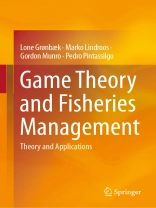This book is the first to present in a systematic manner the application of game theory to fisheries management at both international and national levels. Strategic interaction among fishers and nations exploiting fishery resources is an inescapable fact of life. This has long been recognized at the international level, and is becoming increasingly recognized at the national/regional level. It follows, therefore, that, in order to be able to analyse effectively the management of these resources, the theory of strategic interaction ̶ game theory ̶ must be brought to bear.
In this book the step-by-step development of the game theory is accompanied by numerous applications to the real world of fisheries management policy. As such, it is designed to appeal to policy makers and stakeholders, as well as to graduate students in Economics.
Mục lục
Introduction to the Application of Game Theory in Fisheries Management.- Basic concepts in game theory.- Introduction to Non-cooperative Fisheries Games.- Two-Player Cooperative Games.- Cooperative Games in Fisheries with more than two Players.- Non-cooperative Coalition Formation Games in Fisheries.- Other fishery game approaches.- Conclusions.
Giới thiệu về tác giả
Dr. Lone Grønbæk works as associate professor and Head of Department at the University of Southern Denmark. She holds a Ph D in Economics with specialization in strategic behavior in the management of resources from University of Southern Denmark. She has since 2004 been an active researcher in the field of game theory and fisheries management.
Dr. Marko Lindroos currently works as the university lecturer (natural resource economics) in the Department of Economics and Management, University of Helsinki. He is the head of the department. His educational background is Ph D at Helsinki School of Economics (major subject: economics). He has worked in the field of international of international fisheries agreements for more than 20 years
Dr. Gordon Munro is Professor Emeritus with the Vancouver School of Economics, University of British Columbia. He holds a Ph D from Harvard University. He has worked actively in the field of fisheries management, with particular emphasis on the management of shared fishery resources both international and domestic, for over 40 years.
Dr. Pedro Pintassilgo holds a Ph.D. in Natural Resource Economics from the New University of Lisbon. He is presently a Senior Lecturer at the Faculty of Economics, University of Algarve, Portugal. Over the last 20 years, he has studied the application of game theory to the management of internationally shared fisheries. His research has been published in influential scientific journals and presented in international conferences and workshops.
Of the four authors, Gordon Munro is a pioneer in the application of game theory to fisheries, while Lone Grønbæk, Marko Lindroos and Pedro Pintassilgo are at the cutting edge of the development of game theory relevant to fisheries management.












